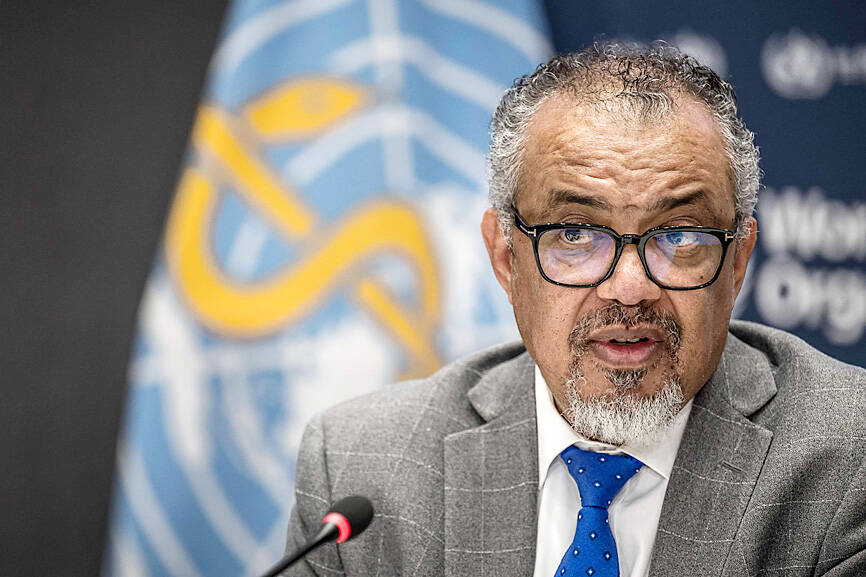The WHO yesterday said that it wanted a code of conduct to bar medical workers from performing female genital mutilation (FGM).
Issuing fresh guidelines on how to halt FGM, the UN health agency highlighted the important role played by health professionals in detecting the widely condemned practice and supporting survivors, but it said there was evidence to suggest that health workers in several parts of the world were themselves often called upon to perform the procedure, rather than it being done by local communities.
“Female genital mutilation is a severe violation of girls’ rights and critically endangers their health,” said Pascale Allotey, the WHO’s head of sexual and reproductive health and research.

Photo: AFP
“Health workers must be agents for change rather than perpetrators of this harmful practice, and must also provide high quality medical care for those suffering its effects,” she said.
FGM involves the partial or total removal of the female external genitalia or other injuries to the female genital organs. It can lead to serious health problems, including infections, bleeding, infertility and complications in childbirth.
An estimated 230 million girls and women have undergone FGM, according to UN Women, with the practice typically carried out on young girls before they reach puberty.
Significant effort has gone into halting the traumatic and painful procedure, which is linked to cultural norms and has no health benefits.
The WHO said since 1990, the likelihood of a girl undergoing the procedure has decreased threefold.
However, it remains common in about 30 nations, with about 4 million girls remaining at risk each year, it said.
The UN health agency said the medicalization of FGM risked “unintentionally legitimizing the practice,” thereby jeopardizing efforts to root it out.
It called in its new guidelines for professional codes of conduct that expressly prohibit health workers from performing FGM.
It also said that there is a “need to positively engage and train health workers for prevention.”
“Research shows that health workers can be influential opinion leaders in changing attitudes on FGM,” said Christina Pallitto, a WHO scientist who led the development of the new guidelines. “Engaging doctors, nurses and midwives should be a key element in FGM prevention and response.”
In addition to prevention, the new guidelines include clinical recommendations to help ensure that FGM victims receive empathetic and high-quality medical care.
Highlighting the large variety of short and long-term health issues caused by the practice, the WHO said: “Survivors may need a range of health services at different life stages, from mental healthcare to management of obstetric risks and, where appropriate, surgical repairs.”

‘TERRORIST ATTACK’: The convoy of Brigadier General Hamdi Shukri resulted in the ‘martyrdom of five of our armed forces,’ the Presidential Leadership Council said A blast targeting the convoy of a Saudi Arabian-backed armed group killed five in Yemen’s southern city of Aden and injured the commander of the government-allied unit, officials said on Wednesday. “The treacherous terrorist attack targeting the convoy of Brigadier General Hamdi Shukri, commander of the Second Giants Brigade, resulted in the martyrdom of five of our armed forces heroes and the injury of three others,” Yemen’s Saudi Arabia-backed Presidential Leadership Council said in a statement published by Yemeni news agency Saba. A security source told reporters that a car bomb on the side of the road in the Ja’awla area in

‘SHOCK TACTIC’: The dismissal of Yang mirrors past cases such as Jang Song-thaek, Kim’s uncle, who was executed after being accused of plotting to overthrow his nephew North Korean leader Kim Jong-un has fired his vice premier, compared him to a goat and railed against “incompetent” officials, state media reported yesterday, in a rare and very public broadside against apparatchiks at the opening of a critical factory. Vice Premier Yang Sung-ho was sacked “on the spot,” the state-run Korean Central News Agency said, in a speech in which Kim attacked “irresponsible, rude and incompetent leading officials.” “Please, comrade vice premier, resign by yourself when you can do it on your own before it is too late,” Kim reportedly said. “He is ineligible for an important duty. Put simply, it was

PRECARIOUS RELATIONS: Commentators in Saudi Arabia accuse the UAE of growing too bold, backing forces at odds with Saudi interests in various conflicts A Saudi Arabian media campaign targeting the United Arab Emirates (UAE) has deepened the Gulf’s worst row in years, stoking fears of a damaging fall-out in the financial heart of the Middle East. Fiery accusations of rights abuses and betrayal have circulated for weeks in state-run and social media after a brief conflict in Yemen, where Saudi airstrikes quelled an offensive by UAE-backed separatists. The United Arab Emirates is “investing in chaos and supporting secessionists” from Libya to Yemen and the Horn of Africa, Saudi Arabia’s al-Ekhbariya TV charged in a report this week. Such invective has been unheard of

SCAM CLAMPDOWN: About 130 South Korean scam suspects have been sent home since October last year, and 60 more are still waiting for repatriation Dozens of South Koreans allegedly involved in online scams in Cambodia were yesterday returned to South Korea to face investigations in what was the largest group repatriation of Korean criminal suspects from abroad. The 73 South Korean suspects allegedly scammed fellow Koreans out of 48.6 billion won (US$33 million), South Korea said. Upon arrival in South Korea’s Incheon International Airport aboard a chartered plane, the suspects — 65 men and eight women — were sent to police stations. Local TV footage showed the suspects, in handcuffs and wearing masks, being escorted by police officers and boarding buses. They were among about 260 South